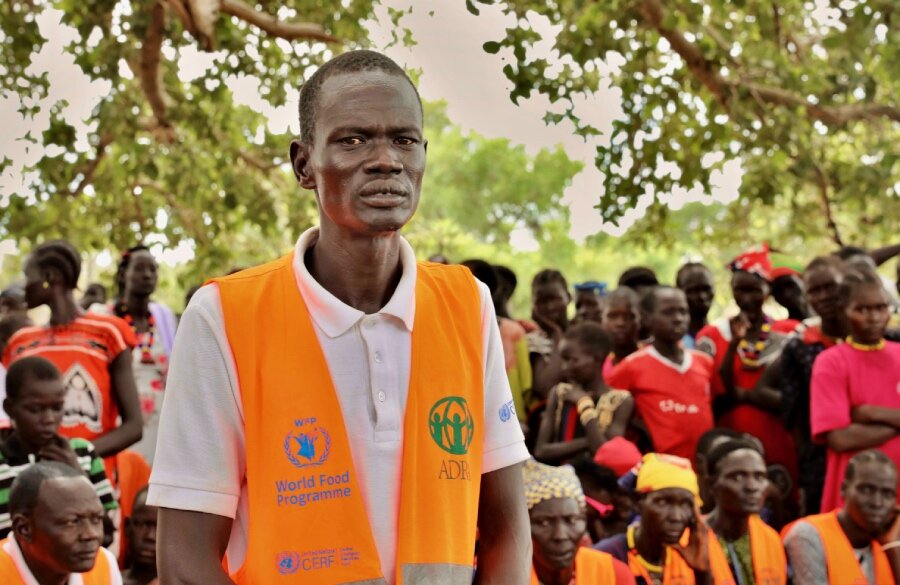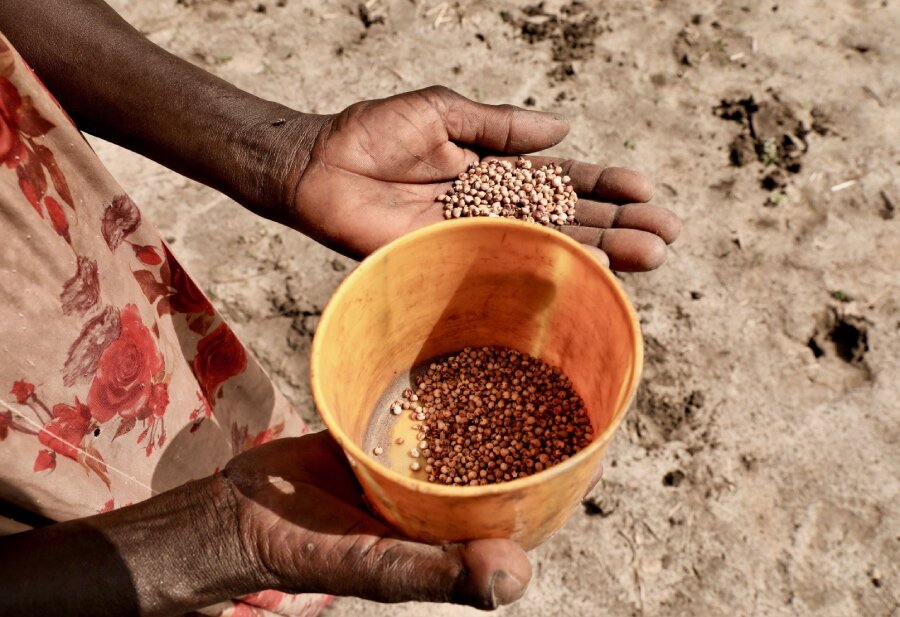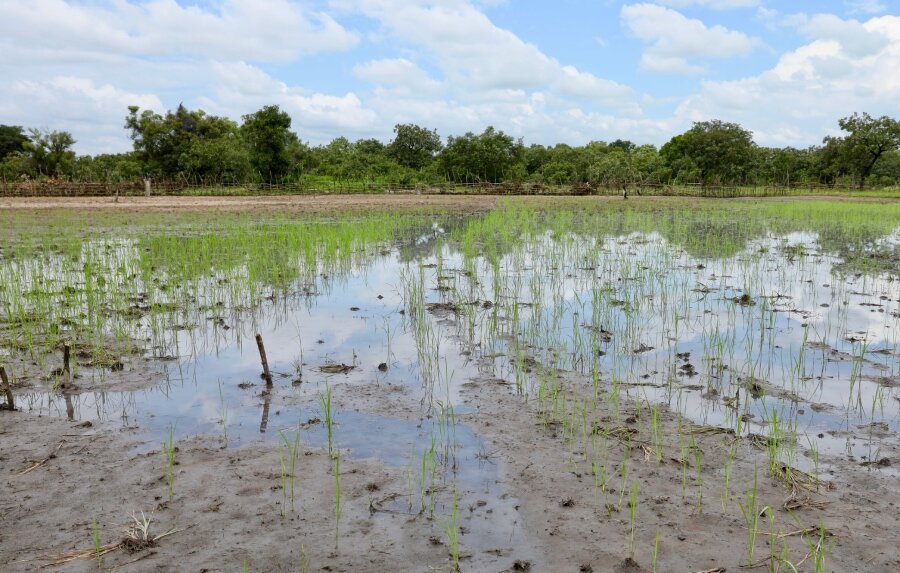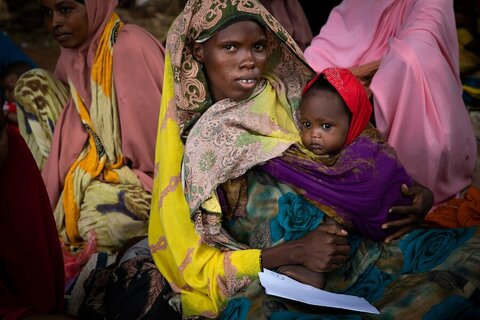South Sudan farmers: ‘Our fight is now against hunger and poverty, not each other’

For three decades, John Mabior lived in fear of the next attack, looting or killing. His community of Malual Mok, in South Sudan’s midwestern Tonj South, had always been at war with its neighbours across the river – the Thony community . Competition over water, land, cattle and crops never ceased, leading to distrust, grievances and conflict on both sides.
In recent years, however, both groups have managed to put aside their differences, farming and trading together.
For most of his life, Mabior could never grow enough food to last him and his family through the year. Always on guard against frequent violence and raids, he could barely tend to his crops. Even when he managed to reap a good harvest, he could not keep the looters at bay.
‘Fertile soil was all around but our stomachs were always empty’
In 2017 his homestead was attacked, his crops looted – by whom it is not clear – and he was almost killed in broad daylight. That was at the height of the lean season when food scarcity in his village had resulted in rising hunger, poverty and crime.
“We lived hand-to-mouth,” he says. “Fertile soil was all around but our stomachs were always empty. I could never grow enough groundnut or sorghum to keep my family and the elderly who depended on me fed. I had to borrow and beg many times during the hunger season.”

That all began to change in late 2018 when Mabior and others in Malual Mok joined a series of livelihoods projects run by the World Food Programme (WFP) and its partners. The aim was to bring communities together with the common goal of growing food and, in the process, peace.
A newly formed cooperative trained farmers in using additional crops, including climate-resilient ones like cassava, to increase harvests. The growers learnt new techniques in the process, and were equipped with tools to build shallow ponds and wells.
WFP also rallied young men and women from both communities to work on labour-intensive projects such as building community dykes to prevent the flooding of farmland. This provided a year-long source of water for farmers and cattle keepers in both Malual Mok and Thony.
Mabior threw himself into the work, eager to make up for lost time. Within three years, he managed to triple his harvest, working solo on his own land and in community farms to help others. His farming expanded beyond groundnut and sorghum to include growing sukuma (collard greens), cowpeas, beans, sweet potatoes, cassava and even rice – making use of the floodwaters that engulfed some parts of Tonj South.
‘Nobody thought our peoples would join hands and ploughs to plant together in peace’
“I am still feeding my family from last year’s crop,” he says, referring to his 2021 harvest. “My life has changed so much in the last three years. I am no longer hungry.”
Now in his thirties, Mabior is financially secure and able to put two of his five children through school.
A prime agricultural area known as Majak-Kot has for decades been a source of great tension between the Malual Mok and Thony communities. Today, however, the farmers from both sides of the Wanh-Alel river are working the land side by side and sharing its precious harvest.
“Nobody on either side … thought our peoples could one day join hands and ploughs to plant this disputed area together in peace,” says Mabior, recalling initial pushback from some members of his community who held grudges against the Thony people. But the promise of a food secure and peaceful future was greater than the memory of the past wrongs.
Michael Kuangjak, a project officer with WFP’s partner ADRA (the Adventist Development and Relief Agency) in Tonj South, says the peace dividends were too obvious for anyone to miss. “Both Malual Mok and Thony led unstable lives marked by isolation, hunger and misery,” he says. WFP programmes “offered thousands of people including men, women and the youth a way out.”

For Haileselassie Berhanu, who leads WFP’s programme activities across Warrap state, community ownership has ensured the durability of today’s peace. But its groundwork was laid in partnership with a raft of other players.
“The path towards peace needed paving,” Berhanu says. “A concerted humanitarian effort brought together various civil society groups, local authorities and NGOs and the wider UN to help the people of Malual Mok and Thony carve out their own pathways to a peaceful co-existence. Those communities are now invested in their future together.”
WFP worked with the Malual Mok and Thony communities to identify drivers of their conflict and find solutions – which were designed by the communities themselves. The effort helped change mindsets within the two conflict-ridden communities from vying over habitable grounds to working together for mutual benefit.
Women and children hit by drought in Somalia

Today Malual Mok and Thony trade with one another, selling the fruits of their labour in WFP vegetable gardens that Mabior took part in creating. But the trading initiative was led by the women of the two communities – they encouraged their sons and husbands to fish together, further strengthening bonds.
Mabior, who recently hosted a young man from Thony looking to sell his fish and crops in Malual Mok's market, neatly sums up the impact of humanitarian intervention here.
”We used to fight one another, raid cattle, loot crops and belongings,” he says. ”But since we began farming and producing, we stopped fighting. Our fight is now against hunger and poverty, not each other.”
WFP's FFA and SAMS projects in Tonj South are possible thanks to donors' support from Canada, European Union, Germany, Korea, UN Multipartner Trust Fund, UK, USA and Switzerland. WFP was awarded the Nobel Peace Prize in 2020 and is working on peace-building initiatives with its partners in other regions in South Sudan. Communities in conflict in the Greater Jonglei and Greater Pibor Administrative Area in South Sudan are in the process of carving out their pathways to peace – finding local solutions for local problems through grassroots initiatives spearheaded by WFP and other partners under the Reconciliation, Stabilization and Resilience Trust Fund.



